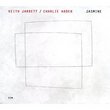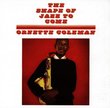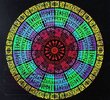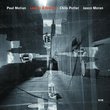| All Artists: Archie Shepp Title: Four for Trane Members Wishing: 2 Total Copies: 0 Label: Grp Records Release Date: 4/8/1997 Album Type: Original recording remastered Genres: Jazz, Pop Styles: Avant Garde & Free Jazz, Bebop Number of Discs: 1 SwapaCD Credits: 1 UPC: 011105021821 |
Search - Archie Shepp :: Four for Trane
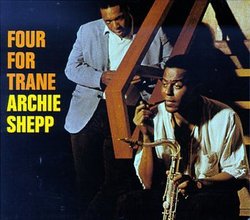 | Archie Shepp Four for Trane Genres: Jazz, Pop
Part of the Impulse Best 50! Series. Japanese exclusive 24-bit 96khz digitally remastered reissue of 1964 album. Packaged in a limited edition miniature gatefold LP sleeve. |
Larger Image |
CD DetailsSynopsis
Album Description Part of the Impulse Best 50! Series. Japanese exclusive 24-bit 96khz digitally remastered reissue of 1964 album. Packaged in a limited edition miniature gatefold LP sleeve. Similar CDs
|
CD ReviewsTaking it somewhere else nadav haber | jerusalem Israel | 03/26/2002 (5 out of 5 stars) "I can totally understand why someone would want to play exactly like Charlie Parker, John Coltrane, Sonny Rollins, or any other musical giant. However, We must remember that these people became who the were not by trying to sound like others, but by following their own path. This CD, the first by Archie Schepp as a leader, shows him to be a musician who follows his own path, and creating some great music while doing so. The music here is not that far out. There are obvious similarities to bebop - in the phrasing, the rhythms - and some fast unison playing ! The differences are important - there is no reliance on chords, the arrangements are more sophisticated. The approach to sound is different. Schepp style of soloing was already developed by that time (1964) - he had a way of talking with his horn - not preaching - but talking like a man telling about an adventure he had or even explaining his view on some issue. His notes are bent as a rule - he avoids playing un-bent notes. Unlike Ayler or Pharoah Sanders - Schepps playing is less enregy-oriented and more reflective. Just like a man enjoying a friendly discussion (or it may be a heated one). The other musicians here are fantastic - Roswell Rudd on trombone, John Tchicai on Alto, Allan Shorter on trumpet, Reggie Workman on bass and Charles Moffett on drums. To me it seems they all support Schepp and help in making his debut a success. Schepp said in one interview that he wants to create new folk music. While his music never became the music of millions, I believe he succeded in making a music that is human and simple in its own way. I dont think his blues singing of the 1990's is the better way to acieve this goal - but then maybe when youv'e created a masterpiece in the early sixties, and followed with so many musical successes - you might as well relax and sing some blues. If you dont know what to expect from the CD, I can try and help by saying that if you like Ornette Coleman - you would like this music too. If you don't know Ornette but you like Bird - you will get a chance to hear a new "free" version of Bird's style - without the harmonic side of Bird, but with compensations in arrangement freedom and sound production. This may be the CD for you if you just want some creative original music, that may give you both joy and inspiration." Great early Shepp!!! Jakob Hellberg | Gothenburg, Sweden | 03/21/2004 (5 out of 5 stars) "This is an awesome record!!! Shepp performs 4 coltrane songs (3 from the classic "Giant Steps" and 1 from "Coltrane plays the blues") as well as his own song "Rufus". The band he has here is stellar:on trombone is Roswell Rudd who would become a valuable partner for Shepp on later albums with a dirty, smeared free-meets-dixieland approach. Alto player John Tchicai played with Shepp in the amazing New York Contemporary 5 along with Don Cherry. His style is quite weird:it sometimes sounds like his saxophone was recorded backwards but it is also very melodic and laid-back. Trumpet player Alan Shorter was the brother of superstar Wayne and plays in a Don Cherry-influenced way. Bassist Reggie Workman played with Wayne Shorter and John Coltrane and has a very fluid way of playing the instrument. He was one of the best bass-players of the 60's. Drummer Charlie Moffett is best known for his work with Ornette Colemans 60's trio. His playing here is slightly more conventional but it still kicks ass and really swings!!!The best description of the music is probably that Shepp gives the Ornette Coleman treatment to Coltranes music. The players play through the themes (wich sounds very different from Coltrane due to the instrumentation) and then doesn't follow any strict chord-changes in the songs, instead following the mood and tempo
of the song-forms. Shepps playing here is brilliant; his tone isn't so big and dramatic (or as brutal)as it became on later albums, instead he focuses on raw, very bluesy, short, broken phrases with a saxophone sound not so different from the swing-players of the 30's like Ben Webster. If your'e interested in Shepps compositional talent this isn't the place to start but if you just want to hear him rip out one great solo after the other you probably can't find a better Shepp album!!! "Syeeda..." and "Rufus..." are the obvious highlights but everything else is really good too (Shepp and Tchicais solos in "Cousin Mary"!!!). The version of Syeeda... is even better than Coltranes original and features the best moment of the album:Shepp's and Rudd's collective improvisation during the latters solo.One last note: If you like this album, try to find the records by the NYC5. They are not easily available but definitely worth looking for!!!" |

 Track Listings (5) - Disc #1
Track Listings (5) - Disc #1